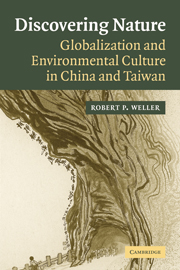Book contents
- Frontmatter
- Contents
- List of illustrations
- Acknowledgments
- 1 Discovering nature
- 2 Night of the living dead fish
- 3 New natures
- 4 Stories of stone
- 5 Garbage wars and spiritual environments
- 6 On “policies from above and countermeasures from below”
- 7 Globals and locals
- List of Chinese characters
- Bibliography
- Index
5 - Garbage wars and spiritual environments
Published online by Cambridge University Press: 05 June 2012
- Frontmatter
- Contents
- List of illustrations
- Acknowledgments
- 1 Discovering nature
- 2 Night of the living dead fish
- 3 New natures
- 4 Stories of stone
- 5 Garbage wars and spiritual environments
- 6 On “policies from above and countermeasures from below”
- 7 Globals and locals
- List of Chinese characters
- Bibliography
- Index
Summary
On the night of 5 May 1990, about a hundred local residents gathered in a community temple in the Houjing neighborhood of Gaoxiong, Taiwan's second-largest city. It was the eve before a referendum on the construction of a new naphtha cracker – a kind of light oil refinery – and people had come to ask the advice of Shen Nong, an agricultural god. They offered incense to the god, and then performed the simplest form of divination by throwing a pair of crescent-shaped “moonblocks” (H: poe) to answer their question: should they vote to oppose construction no matter what kind of compensation the government offered? “Yes,” came the reply. To make sure, they threw the moonblocks again, with the same result. Against all odds, in fact, people performed this divination eleven times in a row, and each time the answer was “yes.”
Word spread about this remarkable set of divinations, and the crowd quickly grew. Every newcomer added more sticks of incense to the temple's incense pot, to show respect for the god. The smoke and smell grew with the crowd, until the incense in the pot suddenly erupted into a roaring fire. People take this to indicate a powerful manifestation of the deity, and it brought even more residents to the temple. From within the crowd, an old woman began to shake and speak wildly. She had been possessed by Guanyin, a bodhisattva associated with mercy and nurturance.
- Type
- Chapter
- Information
- Discovering NatureGlobalization and Environmental Culture in China and Taiwan, pp. 105 - 136Publisher: Cambridge University PressPrint publication year: 2006

